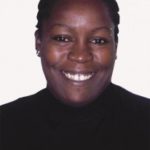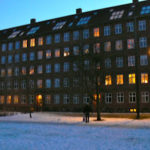Shadows of the Past
Any thoughtful research or understanding of LGBT life in Saint Lucia is clouded over by the May 2011 beating and robbery of three gay men by five armed homophobic and violent local thugs. News of the attack went viral and countless gay and straight people were outraged and vented their anger and disbelief on the Net and in print. The government tried to stem the damage to their tourist image with a lengthy apology, and some suspects were arrested. Since then the locals and tourists appear to have calmed down and moved on. Last year there were close to the usual 300,000 (+/-) visitors.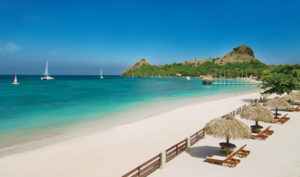
To get around that awful event and determine what LGBT life is like today it’s important to know what set the stage for that homophobic assault: male homosexuality is illegal, a criminal offense in St Lucia. (However, female homosexual acts are not mentioned since colonial lawmakers held women in low esteem and not worth mentioning.) This unfortunate legal situation is directly due to the 1814 British takeover of the island and the subsequent imposition of British puritanical laws and church preference for anti-buggery statutes. Add to this the dominance of today’s Roman Catholic church–due much to previous pre-British French control of St Lucia–which claims about 70% of the population, with the Church of England (Anglican) a mere 5%. The homophobic Catholic position on homosexuality is well known.
When in 1979, Saint Lucia became an independent country within the British Commonwealth of Nations, the government system stayed the same and few laws, if any, changed, including the ones against gays–to the degree that Saint Lucia was the only UN member in the Americas to formally oppose the 2011 UN human rights non-discrimination declaration to include sexual orientation and gender identity. There has been no change in St Lucia’s sex laws for about 150 years, long enough to indelibly imprint on the island’s culture a deep suspicion and dislike of same-sex behavior and attraction.
Christian and criminal–a toxic combination for continued discrimination, bigotry and hostility in any country, made worse by the small island’s tight territory (238 sq mi; 617 sq km) and homogenous population (about 175,000). which is predominantly of African and mixed African-European descent. Africa, past and present, has never been kind to homosexual people.
Moving On
Efforts by the St Lucia tourism board to lure visitors have been modestly successful despite the draconian human rights violations in some of their laws. The island often gets rave reviews for its beautiful beaches, rain forests, mountains and resorts.
St Lucia is similar to Jamaica, which draws hundreds of thousands to its beaches and resorts, balmy weather and warm sun, all of which mask the inhuman legal proscriptions against LGBT citizenry. In addition to tourism, St Lucia attracts foreign business and (recently suspect) offshore investments; these are the island’s two main sources of revenue. Most tourists visit Saint Lucia on cruise ships, mostly in the capital of Castries (population about 11,000) with other towns such as Soufriere, Marigot Bay and Gros Islet also popular. The other major product is bananas.
To its credit, Saint Lucia is home to two Nobel laureates: Sir Arthur Lewis won the Nobel Prize in Economics in 1979, and Derek Walcott who received the Nobel Prize in Literature in 1992.
The Upside of Gay Life in St Lucia
Since LGBT people are everywhere, we are here as well. Leading the efforts to bring equality to the island is the ‘United and Strong’ (U&S) gay rights organization, founded in 2001. Headed by the outspoken and articulate lesbian Kenita Placide and co-executive director Adaryl Williams along the immediate past director, Egbert Felix John, U&S has been active in national and international human right affairs raising consciousness and lobbying the government for law changes.
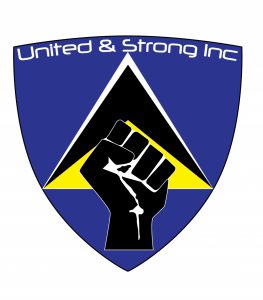 On their website and in in their YouTube video U&S advocate for equal rights, freedom of identity and public expression on behalf of MSM and WSW gay people of St Lucia. United and Strong is a group of both genders. Their mission statement says: “To provide an enabling environment for the advancement of human rights for the LGBT community in Saint Lucia.” Chairperson Kenita Placide has claimed their “main goal as a community is to eliminate stigma and discrimination while creating a society that is accepting and loving and where everyone is equal; not just in words but in actions.”
On their website and in in their YouTube video U&S advocate for equal rights, freedom of identity and public expression on behalf of MSM and WSW gay people of St Lucia. United and Strong is a group of both genders. Their mission statement says: “To provide an enabling environment for the advancement of human rights for the LGBT community in Saint Lucia.” Chairperson Kenita Placide has claimed their “main goal as a community is to eliminate stigma and discrimination while creating a society that is accepting and loving and where everyone is equal; not just in words but in actions.”
In a recent report Kenita wrote,
“Sadly there are few ways we can redress within the law, however U&S works closely with lawyers who are advocates for human rights… we need to raise awareness of the discrimination taking place. U&S actively seeks to involve a range of different kinds of organizations, including faith groups and government to highlight and address both deliberate and accidental discrimination. We are pushing to make sure HIV and other sexual infections are tackled as risks to all. And we try to put sexuality and sex into every conversation possible until people stop running from it.
“…many LGBT live in fear of being ‘found out’ and are thus reluctant to use the critical prevention, education and health services that they need to protect themselves and others. It also puts them off from testing for sexual infections, even, in some cases if they are suffering from HIV or AIDS symptoms.
“We hope to see discriminatory laws struck off the books; to not have our children taught that homosexuality is abhorrent and deviant behaviour; to love freely and walk the streets without fear of derogation and physical assault; to not have our careers and livelihoods depend on limiting our self-expression.
“U&S continues to strive to make Saint Lucians understand that contrary to what they express or believe, being gay is not a western invention but a human reality and that acceptance is the only way forward for the sake of everyone in society, gay or straight.”
In bringing such an activist group together, U&S have created a core community of open LGBT people whom other non-members can approach safely and confidentially. U&S members do not hide their identity or presence, although they are discrete in their work–especially since their first office was torched last fall by arsonists. They have since re-opened at another location. A few flames cannot halt their courage and work.
Recent Efforts by United and Strong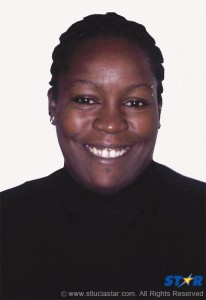
Here are some of U&S’s activities and efforts as described by Kenita (photo right) in a recent report:
1-“We broke new ground in Saint Lucia in June 2011 by opening the island’s first LGBT human rights office, funded by the ASTREA Lesbian Foundation for Justice. Within months however, the facility was burnt to the ground (investigations have not determined the motive or cause of the fire). With continuing support from ASTREA and assistance from the US State Department, the office has now reopened in a new location.
2-“we have reached out to the public at large, advocating for LGBT rights on the island and across the region, and we are involved in HIV testing and counseling.
3-“we hosted an ‘international dialogue’ conference this February (2012) to discuss lesbian, gay, bi and trans issues – working in collaboration with ARC International and Envisioning Global LGBT Human Rights Project… attended by over 85 people from the Caribbean, North America, Africa, Asia-Pacific, Central Asia, Latin America, and Europe. Among its achievements was empowering groups in the Caribbean to have more capacity to document, report and advocate for LGBT human rights. We also had the chance to share and develop strategies about making gay sex legal globally while building solid links between national, regional and international advocacies, allowing us to back each other up and work more closely together.
4-“we sent Kenita Placide to represent U&S at the World Pride gay rights summit in London in July.
5-on IDAHO day (International Day Against Homophobia), May 17, U&S bravely led a handful of members of the LGBT community and their supporters in St. Lucia on their first “Walk for Tolerance.” That same day also happened to be was a ‘ship day’ in the capital city of Castries, so numerous tourists and locals easily viewed the short “joyous event which proceeded from the Ministry of Education to the Prime Minister’s office located along the busy waterfront. The theme of the Walk was ‘Eradicate Hate: Educate!’ and represented the culmination of three successful days of training where members of the local LGBT community and allies learned how to document human rights abuses against LGBT, and some members of St. Lucian police were trained to receive reports of LGBT abuses in a non-discriminatory manner.”
On that important and inaugural IDAHO day (for St Lucia) U&S was backed by the UNAIDS Caribbean Director, Dr. Ernest Massiah who clearly delivered his message that “All Caribbean people are equal.”
U&S was also supported by the USA embassy as part of the Obama administration’s policy of advancing equal human rights for all citizens including LGBT people around the world.
Human Rights and HIV
Also active in St Lucia is the AIDS Action Foundation (AAD) under the tireless direction of Ms Joan Didier, a native Lucian. AAD works with minority groups such as men who have sex with men (MSMs) to advocate for their basic right to “live and love as they want” without fear of legal or social retribution or incarceration since homosexuality is a criminal offense in the country.
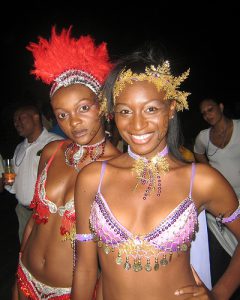 AAD is a non-profit organization, started in 2000 with the daunting mission to overcome the stigma of both HIV and homosexuality through education. Both stigma and discrimination are major ‘curses’ that keep MSM closeted and on the ‘down-low’, both deep-secret masks for their same-sex behaviors. Most of these MSM do not identify as gay or even bisexual since they believe being married protects their identity and self-image. Further locking these men (and women) into their closets are the ‘buggery’ statutes that can result in major or minor jail time, not to mention the horrors of humiliation in being ‘outed’. Didier also decries the discriminatory preaching of homosexuality as sin by the Christian churches, which contributes in no small way to the homophobia facing the efforts of the AIDS Action Foundation.
AAD is a non-profit organization, started in 2000 with the daunting mission to overcome the stigma of both HIV and homosexuality through education. Both stigma and discrimination are major ‘curses’ that keep MSM closeted and on the ‘down-low’, both deep-secret masks for their same-sex behaviors. Most of these MSM do not identify as gay or even bisexual since they believe being married protects their identity and self-image. Further locking these men (and women) into their closets are the ‘buggery’ statutes that can result in major or minor jail time, not to mention the horrors of humiliation in being ‘outed’. Didier also decries the discriminatory preaching of homosexuality as sin by the Christian churches, which contributes in no small way to the homophobia facing the efforts of the AIDS Action Foundation.
Complicating matters, Didier said in an interview, socio-economic class plays a part in people’s reactions to homosexuality. “We know that society operates on different tiers: ‘up there’ homosexuality is accepted,” she says. “Look at certain people who are gay here who have established professions. They don’t suffer any societal stigma or discrimination. They go about their business.” But not so with less fortunate life styles (lower education, less money, lower status). For these people the ‘rule of macho’ has more force since it is a way of expressing power and authority over others; for some it is their only power and can be forcefully or violently expressed. And since macho guy are usually not seen as gay their ‘bravado’ is also cover for being on the ‘down-low’. Worse is when a macho guy vents his insecurity against a suspected or known LGBT person as happened in the recent past when a gay rights leader was threatened with death for begin outspoken. Mentioned at the beginning of this report was the brutal attack by five locals on three gay tourists. The armed intrusion involved robbery but it also was an effort to show macho ‘superiority’ over the unarmed gay tourists by shouting homophobic threats insults and slurs. This attack follow upon at least three murders of gay men over recent years; none of the killers were convicted since they were allowed to use the ‘gay panic’ defense. (Funny how the killers’ macho power seemed to have dissolved “in panic” at the moment of murder, in the presence of a harmless verbal gay ‘come-on’.)
Didier went on to say how AAD’s work was made difficult, first by the lack of definitive surveys and statistics for people with HIV. ““We cannot say that there are 150 men having sex with men and 50 men on the down low and I don’t think we will ever reach a stage in St. Lucia when we will be able to say that accurately. We will be able to do a mapping survey and think we have an idea [but] I’m not sure it will still reflect the situation because there is such a high level of distrust among those communities that it’s going to be very difficult… The men who are married but who are also into having sex with men don’t consider themselves MSM at all. So even if we ran a study, we won’t access that group–and that’s the group that’s transmitting HIV/AIDS both to other men and to women.”
Gay Life on the Streets
Because sexual orientation is not visible, other than perhaps (questionably) in clothing or gestures, most LGBT people in St Lucia are able to ‘pass’ and not be known to others. But there is ‘gaydar’ that sensitizes gays to one another and unavoidably friends join with other friends into a community that is not likely to be easily noticed. Most LGBT socializing in countries that have laws against gays is done behind closed doors in private homes or blended into mixed crowds at clubs and restaurants. Usually its the more courageous activist groups like U&S and AAD that dare to show a public presence. U&S has a video of their conference on YouTube. As for local LGBT venues there are none. Such a place would easily be targeted by trouble-makers, or worse.
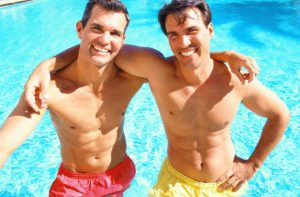 However, given the wide range of bars, clubs and resorts that cater to different segments of local and tourist society, there are fairly safe ‘blend-in’ places found around the capital and other towns. Gay-friendly Boat Yard Pub is said to draw worldly-wise clientele to it water’s-edge location for sunset happy-hour drinks and fine dining day and night.
However, given the wide range of bars, clubs and resorts that cater to different segments of local and tourist society, there are fairly safe ‘blend-in’ places found around the capital and other towns. Gay-friendly Boat Yard Pub is said to draw worldly-wise clientele to it water’s-edge location for sunset happy-hour drinks and fine dining day and night.
A second option is suggested by well-known gay travel journalist Andrew Collins: Le Sport Resort
“With a stunning beachfront location at the rugged northern tip of St. Lucia, the upscale, all-inclusive Le Sport resort has long had a following with gays and lesbians – it’s an adults-only, spa-oriented property that’s perfect for a stress-relieving vacation. The resort is well-suited to couples or singles, and it encourages guests to develop their own personalized spa-retreat programs, complete with sporting activities (golf, diving, tennis, windsurfing, fitness and yoga classes, and so on), body and beauty treatments, and exceptional meals at the trendy Pan-Asian restaurant TAO. And yes, one option is simply whiling away the day reading a book on gorgeous Cariblue Beach. Although Le Sport is a mainstream property with a predominantly straight clientele, the clothing-optional sundeck, elegant piano bar, and sophisticated vibe ratchet up the GLBT appeal.”
Beyond the quest for gay rights and legalization of the lifestyle, and away from the gay-comfortable eateries and sleeping places. this island offers visual treats and pleasant adventures. Frommers has a good summary of escapist ‘tourist’ life on St Lucia, from volcanos to mountains to rain forests. The guide is available here.
The Downside of LGBT life
Meanwhile, the lives of Lucian LGBT people are quite different from the playful, pleasant and superficial tourist experiences. Here are some less pleasant features of being gay in this nation-island.
For a unique look inside the secretive gay life of a Lucian gay man, one can read ‘Confessions of Closet Homosexual in Saint Lucia‘, a four-part series of articles written by Kayle Lewis and courageously published in the St Lucian Star newspaper in 2010 to explore and confess why ‘Gay Men Live A Lie’ and to express a ‘Gay Man’s Struggle to Find True Love’.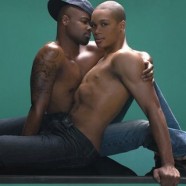
Using a diary-style format, Kayle Lewis wrote abut his life. “When I decided to write this series of articles from within the closet, my objective was neither entertainment nor sensationalism. This is way too serious an issue.
“The gay man’s closet is equally filled, with darkness and light, however, the darkness in this case always overshadows the light. Since I am sharing with you the gay man’s closet, let me share with you what can be found within: lies, deception, mis-trust, loneliness, isolation, depression, alcoholism, gut-wrenching emotional pain, anger, frustration, denial, lust, betrayal, drugs, raw passion and rejection… The gay closeted man can be any man; the only way of defining him is deceptively secretive. You cannot tell by mannerism, you sometimes cannot even judge based on association. You see, when you have a secret, you go to great lengths to protect it, and most times, the bigger the secret, the more the lies will flow…
“I am in the closet; I am simply protecting myself from the outer elements, the outer elements of emotional abuse and ostracization, and who knows, perhaps physical abuse. The closet is my choice. It is painful and often times very lonely—but it is safe for me… I write here for I want the “fake straights” out there, to stop hiding behind their macho persona and stop being so unkind to those who are not like them, and to get them to become more responsible with their actions. I write because I want readers to wake up to the harsh reality that perhaps you yourself might just be part of a deceptive love relationship.
“I would like to make a point that I omitted and it’s an important one—-femininity in a male does not equal homosexuality as masculinity does not always equal being straight. Too often, feminine young men have been branded as being gay and often times this is not the case. While I have listened to debates and discussions over the years, it was not easy for me to fully accept that my sexual attraction was towards the same sex. I came to the realization that truth is truth, and that its nature is to be told. As a matter of fact, the more you deny truth, the more it gathers strength… Many people continue to deny their feelings. I struggled with my own for years. It’s amazing that I am still alive.
“I’ll never forget one instance when I saw my lover on the street with his girlfriend hanging with his buddies. He had left my bed only the morning before and yet the next day, he did not so much as acknowledge me! That night, I drank myself to sleep…”
- Sex and sexuality: it’s amazing how something which was created so pure and wholesome has become so complex. My words here were merely designed to bring to light a situation which is a reality and which is kept under the usual “let’s pretend” Caribbean carpet. Of course there are other issues, but I decided to bring this one to light for it is important to me.
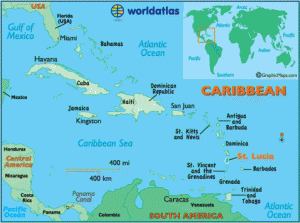
- Let’s stop skirting the issues of sex and sexuality and commence open discussions, for we urgently need to engage our young people in frank and healthy discussions across the board.
- The issue of homosexuality in the Caribbean for too long has been viewed in a negative manner but my decision to write these articles was to highlight the reality, the reality of the masculine men who have sex with men. The masculine men who swing both ways while being married to beautiful and respectable women.
- A person’s sexuality does not define who they are. I can be gay but I can be the most dedicated and respectful professional. I can be gay and be the most decent human being that you would ever meet. Gays are human beings and, as such, we have the right to lead lives of normalcy.
- To those of you young men and women who are reading my words and are struggling with your sexuality, my friend, do not feel ashamed of what you are feeling. If you realize that your sexual attraction(s) is towards members of the same sex, find someone that you can talk with, whom you can speak to openly and in an atmosphere of trust…”
Some Other Troubling Reports About Life in St Lucia
1- From the US Department of State Human Rights Report for 2008:
“There was widespread social discrimination against homosexuals in the deeply conservative, highly religious society. There were few openly gay people in the country. There were at least two cases of violence against homosexuals, including one young man who was killed when he was hung from a tree because he was openly gay… There was widespread stigma and discrimination against persons infected with HIV/AIDS, although the government implemented several programs to address this issue, including a five-year program to combat HIV/AIDS. The UN Population Fund also provided support for youth-oriented HIV/AIDS prevention programs. An HIV-positive woman who worked for the government quit in protest over demeaning conditions in the workplace after her supervisor mandated that she use the restroom at specific times only, after which staff would clean the restroom…”
2- Child abuse remained a problem… There were few social welfare programs in the country, and the existing ones were overwhelmed… Although there was little evidence of formalized child prostitution, transactional sex with minors was a common occurrence.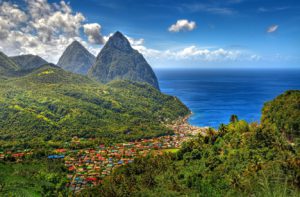
3- From UN High Commission for Refugees, 2011 Country Reports on Human Rights Practices in Saint Lucia:
The most serious human rights problems included reports of unlawful police killings, abuse of suspects and prisoners by the police, and long delays in trials and sentencing. Other human rights problems included corruption, violence against women, child abuse, and discrimination against consensual same-sex sexual activity. Although the government took some steps to prosecute officials and employees who committed abuses, the procedure for investigating police officers was lengthy, cumbersome, and often inconclusive. When the rare cases reached trial years later, juries often acquitted, leaving an appearance of de facto impunity.
4- St Lucia does not vote for for Human Rights, January 2011
The United Nations General Assembly voted on December 22 to restore the reference to sexual orientation in a resolution condemning extra-judicial, summary and arbitrary executions, but the St Lucia delegation rejected their Prime Minister’s pledge in Parliament this April to “stand against stigma and discrimination in all its forms” and “guarantee non discrimination against persons on the basis of sexual orientation.” St Lucia stood apart from Caricom in voting no.
Further reflections about LGBT life in St Lucia:
(2006)
-Should gays living in St Lucia have reason to feel threatened?
“Ideally, they should not be afraid because this is a democratic society that guarantees people freedom of expression. Realistically though, considering the recent alleged hate crimes in St Lucia people who openly declare themselves gay should be afraid that they might themselves be victims of hate crimes.”
(2003)
-“It’s so different when I travel overseas. Sometimes, I forget that I’m gay because there is no one calling me names. It is only in St Lucia that people harass me. There are people who hate me without even knowing me. How can you hate somebody without knowing what they are like on the inside? Sometimes, I feel like I have to live my entire life dealing with that kind of reaction from people,” Shermark explained.
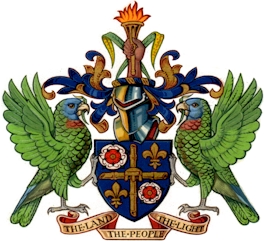
-“Back in my day as a boy, we would hide in a corner and ask, quietly: “Dey say dat man like little boys. You believe dat man boolin’ for true?” Today, the question being asked on radio, TV and the Internet is: “Are we a homophobic society?” (photo right: St Lucia coat of arms)
-“So then, are we a homophobic society? Of course we are – if I understand the word. No one is challenging the claim that at least three St. Lucian men were killed in as many years because of their sexual preference. We know how we think about “same-sex” sex. We know how men exhibiting feminine features are treated in our society, where it’s more difficult to assume that a woman is gay.
-“I would like to see this debate not head in the direction of exposing closet gays, but in the direction of exposing those supposedly respectable and responsible persons in our society who have lived a life of abusing young men and women for all their adult lives. Nor must we be selective in which serial sexual offenders we expose. When St. Lucia’s best known case was publicly exposed, ridiculed and forced to leave his job, those responsible for his public execution also knew of another case of a well-known local businessman with top political credentials who had been accused by his two nephews of taking them through a long life of sexual abuse. So bad was this particular case that the two young men sought and got asylum in North America to protect them from their uncle’s continuing abuse. That was back then. Today, almost two decades later, you won’t imagine where the culprit sits–in the fullest view of the Public Eye, in public office…”
Google Photo Gallery for Saint Lucia
GlobalGayz News & Reports of Saint Lucia
Anyone interested in the condition and circumstance of LGBT people in the Caribbean should read the report issued by the International Lesbian and Gay Association in 2011.
It is a complete report that lists the gay-friendly as well as homophobic states in the Caribbean.
In the following nine countries homosexuality is criminalized:
- Antigua and Barbuda,
- Barbados,
- Dominica,
- Grenada,
- Jamaica,
- Saint Kitts and Nevis,
- Saint Lucia,
- Saint Vincent and the Grenadines,
- Trinidad and Tobago.
Curiously the USA maintains formal diplomatic relationships with all seven Caribbean countries that criminalize homosexuality. This is either a paradox or a blessing:
The Embassy maintains foreign relations with these seven governments: Antigua and Barbuda, Barbados, Dominica, Grenada, St. Kitts and Nevis, Saint Lucia, St. Vincent and the Grenadines. The US says it seeks those governments’ support in multilateral forums to promotes democracy and economic stability in those islands and to facilitate the entry of legitimate visitors, and finally, to assist U.S. citizens and businesses overseas. More recently, under the Obama administration these embassies are also committed to promote human rights for all. Whether these small countries are listening is obvious; none have changed their laws to legalize same-sex orientation.
Fortunately in the Caribbean there are more countries in which same-sex activity is legal (but not free of homophobia)
These are:
- Aruba,
- Bahamas,
- British Virgin Islands (Tortola, Virgin Gorda, Jost Van Dyke, Anegada), legal since 2000
- Cayman Islands, since 2000
- Cuba, since 1979
- Curacao,
- Dominican Republic,
- Montserrat, since 2000
- Netherlands Antilles (Bonaire, Saba, Sint Eustatius)
- French West Indies (Antilles) (Guadeloupe, St Barts, Martinique, St Martin), since 1791
- Haiti, since 1986
- Puerto Rico,
- Sint Maarten,
- Turks and Caicos Islands, since 2000
- US Virgins Islands (St. Croix, St. John, St. Thomas, Water Island), since 1984
Also, see this LGBT report on eleven Caribbean destinations that includes some gay owned and gay-friendly venues.

